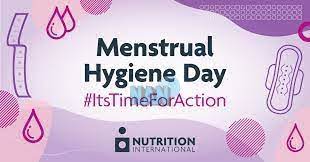Foundation Advocates Domestication Of Menstrual Hygiene Rights In Nigeria
Latest Headlines, News Across Nigeria Saturday, May 28th, 2022
(AFRICAN EXAMINER) – As Nigeria joins the rest of the world to mark this year’s Menstrual Hygiene Day, the Bread of Life Development Foundation has advocated for the domestication of menstrual hygiene rights in the West African nation.
Menstrual Hygiene Day is observed on May 28 each year, coinciding with the International Day of Action for Women’s Health 2022, across the world. The theme for the 2022 commemoration of the day is “To create a world where no women or girl is held back because they menstruate by 2030”.
The day highlights the importance of menstrual care and raises awareness about the social issues faced by women during menstruation and those who don’t have access to sanitary products. It brings together the voices and actions of non-profit, government agencies, individuals and the media to promote good menstrual health and hygiene for everyone around the world.
It also aims to break the silence, raise awareness and change the negative social norms around menstrual health and hygiene. The day also equally provides an opportunity to engage decision-makers and increase the political priority to catalyse action for menstrual health and hygiene at global, national, and local levels.
In a statement by its Programme Officer, Racheal Ogundipe. the Foundation said the right to menstrual hygiene will guarantee access to affordable menstrual hygiene products to absorb or collect the flow of blood during menstruation and ensure the provision of menstrual hygiene sensitive toilets that guarantee privacy for women and girls to change menstrual materials.
According to the statement, menstruation is an essential and inevitable activity for Nigeria’s 42 million women and girls of reproductive age, necessitating a human rights approach to menstrual hygiene management and development of a policy framework at national and state levels to safeguard this right.
“The Sustainable Development Goal (SDG) 6.2 hopes to ensure that by 2030, there is access to adequate and equitable sanitation and hygiene for all, paying particular attention to the needs of women and girls. To achieve this, public and private sector players should initiate actions towards the progressive realisation of menstrual hygiene as a human right”, the statement said.
The statement added that the first step towards the realisation of the human right to menstrual hygiene in Nigeria is the development of a menstrual hygiene policy in Nigeria, noting that there is presently no approved policy at the national and state level on Menstrual Hygiene Management (MHM).
It therefore called on the Federal Ministry of Women Affairs and Social Development and the Nigerian Technical Working Group on Menstrual Health and Hygiene Management (MHHM) to fast track the development of policy on menstrual hygiene management in Nigeria.
The statement also noted that menstrual hygiene is a cross-cutting issue and urged MHM related ministries to review their sector policies to address it, adding that proper menstrual hygiene management requires access to materials and facilities such as water, sanitary pads, bins, and gender-sensitive toilets in workplaces, offices, schools, public places, markets, religious centres, and other public places.
Notably, every Nigerian woman of reproductive age has a right to affordable Menstrual Hygiene products as an essential human need. However, Menstrual products are presently unaffordable to many Nigerians, mainly the girl child and other low-income women in vulnerable communities.
“Menstrual Hygiene products and mode of disposal should be easily assessable to every girl, child, and woman. The need, therefore, arises to develop policy and legal frameworks that guarantee the right of Nigerian women to menstrual hygiene, ensuring access to essential equipment, material, and facilities that help protect their dignity and prevent health risks”, the statement added.
The statement also harped on the need for Federal Government to reduce import duties and taxes on menstrual products and make it Value Added Tax (VAT) free to ensure the affordability of menstrual products, adding that educational institutions should make menstrual hygiene products accessible at a free or subsidised rate to every girl child of reproductive age.
“This is in line with best practices. In countries such as Scotland, New Zealand, France, Kenya, and Botswana, different methods have been introduced to manage menstrual hygiene, such as providing free sanitary pads to all school-aged girls. Kenya also eliminated the “pink tax”, which is the charge on menstrual products.
“We call on philanthropic/charity organisations, religious groups, non-governmental organisations, and politicians to sponsor the distribution of subsidised menstrual pads for women below the poverty line and girls in low-income communities”, it further stated,
The statement equally pointed out that most public offices and business premises are not menstruation friendly, and that most workplace administrative manuals and human resources policies are presently silent on menstrual hygiene.
“We, therefore, call on corporate organisations to ensure that the menstrual needs of their staff are addressed in human resources manuals and policies, paying attention to the menstrual needs of women in their organisation. Specifically, women of reproductive age should be entitled to menstrual hygiene leave, and it should be clearly stated in the workplace policies”, the statement stressed.
It further recommended that provisions should be made for menstrual hygiene bins in institutions and public toilets in Nigeria for the safe disposal of menstrual wastes, adding that public authorities should also enforce the quality standard of menstrual hygiene products like menstrual pads, menstrual cups, and tampons, as several substandard menstrual products in the Nigerian market compromise menstrual hygiene health. We urge professional, trade and labour unions to take this as an advocacy action.
“Generally, households and public water, sanitation, and hygiene facilities should allow women and girls to safely, comfortably, and privately manage menstruation – and must be accessible to girls and women with disabilities”, it further suggested.
Related Posts
Short URL: https://www.africanexaminer.com/?p=77294






















